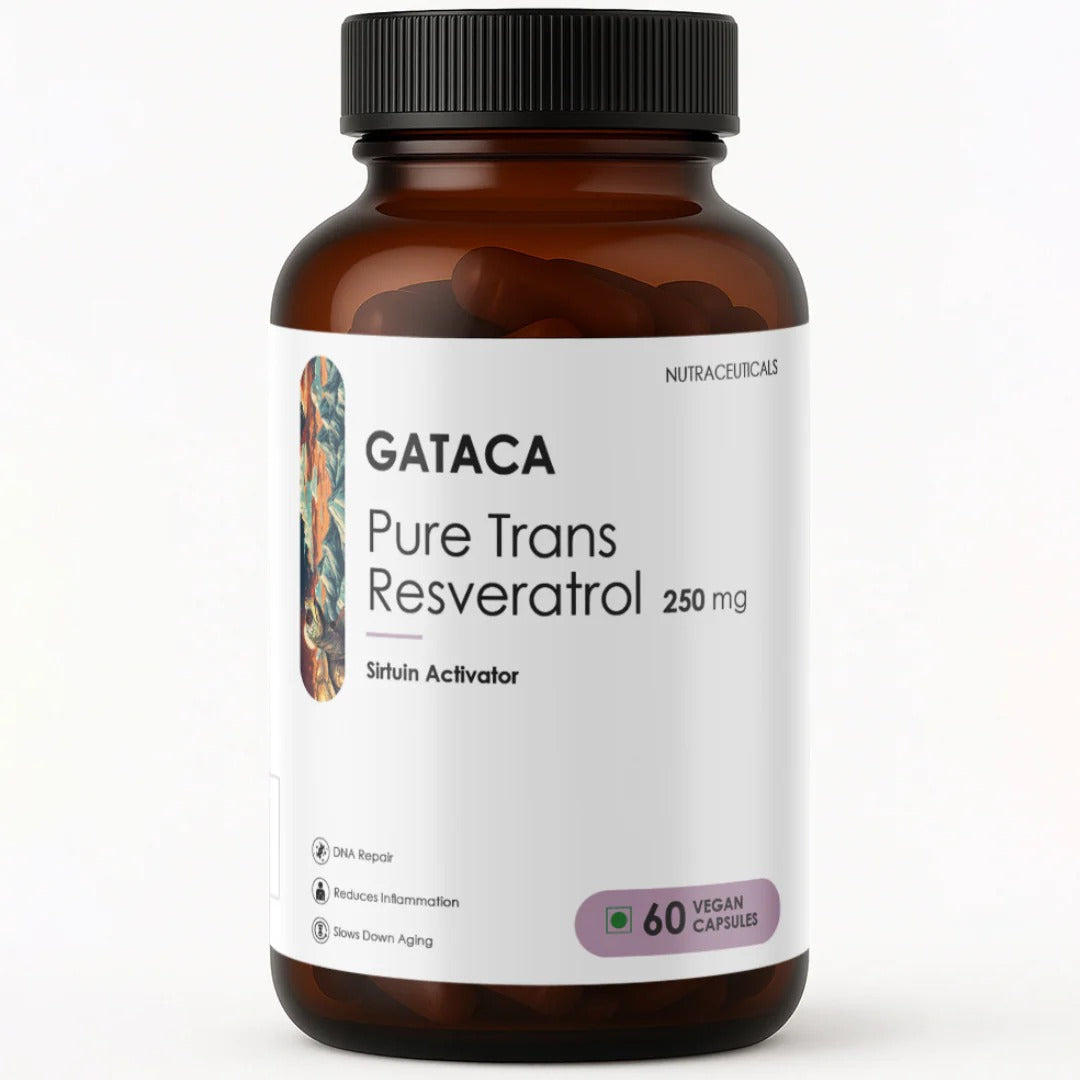Introduction
Resveratrol is a polyphenolic compound that plants produce when they are attacked by pests. A very well known source is the Japanese Knotweed plant, which produces large amounts of this compound for self-defense. So, think of it as something that improves plant immunity.
Dr. David Sinclair - a giant in the longevity and wellness scene is a huge advocate for resveratrol and its potent benefits. Since it is a very good antioxidant, the production of superoxides is reduced- meaning less damage to cellular DNA and better functioning of cells is a given.
What Is The Difference Between Trans-Resveratrol And Resveratrol?
Resveratrol is a compound that comes in 2 different orientations- towards the left and the other one towards the right. They are called the cis- and trans-forms of compounds.
Normally, even if they are structurally the same, the difference in orientation can mean a huge change in how they will be taken up by cells- ie. their bioavailability.
The trans-form of resveratrol is 30 times more bioavailable than the normal cis-from. The trans-form is more commonly found in yoghurt, while the cis-form is easily available in grapes and berries- especially their skin and in peanuts, in dark chocolate and in pistachios. Resveratrol is well known for its beneficial effects on the heart, the circulatory system - all of which can help the brain, the heart, the liver and kidneys work better. Trans-resveratrol is more potent in general and so has marked anticancer, antioxidant and anti-inflammatory properties and it is what is added in supplements.
Trans-Resveratrol vs. Resveratrol Absorption Rate
Trans-resveratrol is more easily absorbed by the body, when compared to the cis-form, but absorption and bioavailability studies have shown that oral bioavailability is normally on the lower end, even if almost 75% of the given dose is absorbed readily.
Trans-Resveratrol vs. Resveratrol For Longevity
Hundreds of studies have shown that resveratrol is a natural compound that does a lot of good in chronic conditions - especially when there is chronic inflammation involved.
Longevity is a great goal to be working towards for sure, but just living long is never enough. You need to live for long AND stay disease-free. Now, that should be a priority.
Both forms are good for the ventricles of the heart, for better cerebral blood flow, helps the liver cells function better due to its high antioxidant content, helps protect the beta cells of the pancreas- which is how glucose levels will be regulated and insulin insensitivity will get better over time.
They also has this innate ability to activate proteins called Sirtuins- short for SIRT, that are responsible for ensuring that cellular DNA does not get damaged, it promotes autophagy, helps reduce active inflammation, helps in vascular remodelling and lastly- regulates cell death and function.
SIRT1 is a specific protein that is activated by both, and low levels have been linked to greater levels of inflammation and metabolic disease. Autophagy is a process where dysfunctional cells are removed and their parts or organelles are recycled- all in an effort to improve cellular health.
Trans-Resveratrol vs. Resveratrol For Inflammation-
Both forms are effective against inflammation, which is why it is a great treatment option for autoimmune conditions like rheumatoid arthritis, diabetes, lupus, inflammatory bowel disease etc.
Conclusion
Resveratrol is a compound that is a stilbene- which is an aromatic hydrocarbon that is made by many plants. It is mostly employed in immunity, though the scope for use is much wider when it is used as a supplement. Thousands of pre-clinical studies have shown that resveratrol is a compound that has anti-inflammatory and antioxidant properties - all of which ensure that there is minimal cellular damage. It is especially pretty useful for menopausal women who deal with bone loss and heart disease due to a massive reduction in hormones.
Resveratrol is normally found as two isomeric forms, but the trans-form is more easily taken in by cells, when compared to the cis-form, due to the slight difference in orientation. But, it doesn’t mean that the cis-sibling is useless.
FAQs
1. What is the difference between Trans-Resveratrol and regular Resveratrol?
Trans-resveratrol is one kind of isomer of resveratrol, while the cis-from is the other one. Their orientations differ, which is why one form is more easily absorbed by cells while the other one is not.
2. Which form of Resveratrol is more bioavailable and effective?
The trans-form is more bioavailable, which means it can be absorbed more easily, when compared to the other isomer.
3. Can both forms of Resveratrol help with brain function and cognitive health?
Yes, both cis and trans forms of resveratrol are helpful for the brain. A 75 mg/day dose was supposed to be pretty effective in improving blood flow to the brain in both diabetic and postmenopausal individuals.
4. Are there any major differences in dosage recommendations for each form?
Trans-resveratrol is more often found in supplements, while the cis-form is found in smaller concentrations. A minimum dose of 75mg/day is beneficial, though most supplements come in much higher dosages- like 250 mg for example.
5. Are there any side effects or risks associated with either form?
Trans-resveratrol can improve blood flow and hence it should not be used when someone has blood clotting disorders and since it is chemically similar to oestrogen - which means it can make hormone dependent cancers worse than before.






